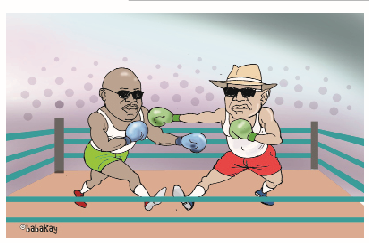The defection, early this week, of 27 members of the Rivers State House of Assembly, said to be absolutely loyal to former Governor Nyesom Wike, from the People’s Democratic Party (PDP) to the All-Progressives Congress (APC) is no doubt a grand ploy to end the current leadership of the state.
Even before the mass decamping, attempts were made by some members to impeach the governor consequent upon which the state assembly was balkanized, with two persons laying claim to the speakership position, forcing parties to approach the court for adjudication.
In an interesting twist, Edison Ehie who was duly recognized as speaker by the court, declared the seat of the defectors vacant citing provisions of the 1999 constitution as amended.
Although it is a battle between Wike who is currently a senior minister in charge of the ‘lucrative’ FCT in the Tinubu cabinet and his anointed successor, Governor Siminalayi Fubara, the raging war is ultimately a struggle for the soul of the oil rich Rivers State. And archetypal of such fights by gladiators, the masses will be the ones to bear the brunt, as governance in the state will inevitably be stagnated.
A familiar turf
Nigeria’s political history is replete with open confrontation between former governors and their successors, especially anointed successors. In Kano, Rabiu Musa Kwankwaso anointed the incumbent national chairman of the ruling APC, Abdullahi Umar Ganduje, as his successor and less than a year into his administration, a cold war reared its head before snowballing into a fierce confrontation. The feud between Kwankwaso and Ganduje has remained unabated till date.
A similar scenario played out in Zamfara between Sani Yerima and Mahmuda Aliyu Shinkafi; in Sokoto, Aminu Waziri Tambuwal and Magatakarda Wammako started as buddies and then things turned sour. It has been so till date. Governor Godwin Obaseki fought his successor and benefactor, Adams Oshiomhole, to a standstill in Edo. Till date, they are parallel.
To the discerning mind, what these scenarios suggest is that the governor-predecessor scuffle as we currently are witnessing in Rivers is a character of Nigerian politics. But many consider the case of Rivers as being peculiar because it came too early. Less than six months after assuming office on May 29, 2023 as the governor, Fubara who was Accountant General and Wike’s close ally, parted ways with his principal.
Battle for structure
Essentially, there are widespread reports that three things are responsible for this Wike-Fubara scuffle which is already taking a very worrisome dimension. One key reason for the battle is the control of the political structure supposedly built by Wike in the state.
The FCT minister alluded to the issue of structure when, in one of his reactions to the fight, he said, ‘nobody can take away the political structure in Rivers State’.
There is also the allegation of an entente cordiale for a ‘25 percent’. It was alleged that there was a gentleman agreement before Fubara was anointed that about 25 percent of the state’s allocation will be ceded to one power that be. The governor reportedly reneged, hence the battle. But Wike has also refuted this allegation.
Also listed as a fundamental reason for the scuffle is the struggle over who become chairmen of the 23 LGAs come February 2024 when the state plans to hold the council polls.
It is a fact that scuffles of this nature always have both remote and immediate causes and, in the days ahead, Nigerians would be treated to a plethora of reasons for this clash, which is largely driven by selfish interest.
Assuming without conceding that the trio of structure, 25 percent, and who clinches the chairmanships of the 23 council areas are the reasons for this scuffle, why should just two persons arrogate to themselves the right to decide the fate of Rivers people?
One reason I find so pedantic is the issue of structure. Should the governor who, by virtue of his position, is the leader of the party not be the one in charge of state structure? Wike needs to be reminded that he built whatever he claimed to have built as structure by virtue of his position as governor. So, it is about the office of governor and not wielding the influence of an individual; pure and simple.
While Wike played a pivotal role in Fubara’s ascent to power, it’s important to acknowledge that success is often a collective effort. Wike himself had support during his various political roles. Thus, the attempt to exert continued dominance over a sitting governor seems contradictory, especially from someone who has spoken against such practices.
Is it not bemusing that someone who, as governor, assumed full control, fought his predecessor and former boss to a standstill and, never allowed space for anybody to control him, now wants a serving governor to remain perpetually answerable to him?
One captain for a ship
Earlier this week, a tweeter handler, obviously trying hard to analyse the Rivers State scenario, said, ‘If you give someone a cap and then ask for his head, of what use is the cap?’
Perhaps, it is good to remind the gladiators in this Rivers fight that there cannot be two captains in a ship. There is always only one leader at a time. Any attempt to govern Rivers by proxy will be a hard sell because even if the lawmakers succeed in impeaching Fubara, there will be another governor and there is no guarantee of a pliable successor.
But I doubt if Fubara will survive this onslaught and here are my reasons. It is clear that Wike has the backing of both the ruling APC and, indeed, the presidency. The APC has had its eyes fixed on getting Rivers, one of the nation’s vote banks and the current scuffle provides it all it needs to actualize that.
Clearly, Wike is steering the state, using his ‘structure,’ in the APC’s direction and I see the party giving him maximum support. Additionally, it is to BAT’s advantage that the APC have full control of Rivers, as that will count well for him and the party come 2027. In the days ahead, Fubara may be treated to a brazen display of federal might and that could further sway the balance in Wike’s favour.
Another reason why I think Fubara may not survive the political duel is that his party, the PDP, is ‘weather-beaten’ and has since lost its voice. Yes, the party issued a statement calling on the Speaker to declare the seats of the defectors vacant and urging INEC to conduct fresh elections. But the question is, which Speaker? Which INEC? And I hope readers know what I mean. Survival seems bleak for Fubara.
At the end of it all, it will be a Fubara fighting his fight all alone, probably without the requisite structure. I think the governor started this whole thing a little too early. Fubara’s early confrontation is his biggest undoing. Garnering support before challenging Wike could have strengthened his position. Nevertheless, standing with Fubara underscores the principle that no individual, regardless of influence, should wield excessive control over a governor elected by the people.
Needed: Alternative Dispute Resolution
Chief Judge of the Federal High Court (FHC), Justice John Tsoho’s disclosure that the Court has a staggering 144, 910 cases to attend to in the new legal year has further underscored the need to strengthen alternative dispute resolution mechanisms. With 95 judges on the bench of the FHC, that means on an average, a Judge will handle one thousand, five hundred cases.
One can now understand why litigation takes unnecessarily longer time to adjudicate in Nigeria. Now more than ever before, there is the need for the judges to make adequate use of technology and, importantly, accord top priority to alternative dispute resolution.





